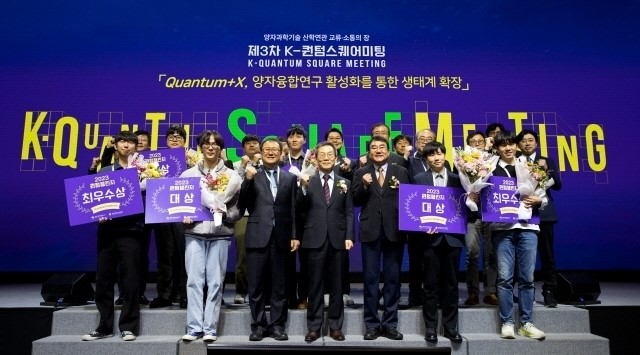2024-01-10
This year, the Korean government is allocating 128.5 billion won in 17 projects for quantum technology development and infrastructure.
At the ‘K-Quantum Square Meeting’ held at the JW Marriott Hotel on the 10th, Kim Yeon, Head of the Quantum Science and Technology Industry Division of the Ministry of Science and ICT, announced the government’s direction for quantum support in 2024.
In June of the last year, the government announced its vision, aiming to position South Korea as a leading global quantum economy by 2035 through the ‘Korean Quantum Science and Technology Strategy.
Furthermore, on the 5th of this month, President Yoon Suk Yeol attended the ‘New Year’s Greetings for Experts of Science and Technology and Information Broadcasting and Communications’ and promised “to significantly strengthen investments in three major future technologies, including artificial intelligence (AI), advanced bio, and quantum.”
On this day, Kim Yeon said that they secured a budget of 128.5 billion won for this year’s government support for quantum research, a 32.7% increase from 96.8 billion won the previous year. The focus will be on advancing technology development and commercialization in quantum computing, quantum communication, and quantum sensing. Additionally, there will be a concentration on international collaboration, workforce development, and infrastructure construction.
She emphasized, “Quantum science and technology will be a game-changer that may shake the foundation of the information and communication ecosystem,” and expressed expectations for establishing next-generation defense/security systems and addressing societal challenges in industries, healthcare, and public sectors.
Quantum science and technology is already recognized as future key technologies and national security strategic technologies, and major countries are actively setting up policies and making significant investments in this field.
As a new program this year, “Quantum Cluster,” will be launched as a quantum testbed development initiative. With a budget of 10 billion won ($7.5M USD), the project aims to establish a test network and center for quantum network technology development. The project is set to commence in April after the selection of operators.
In addition, 11.5 billion won ($8.7M USD) will be allocated to foster quantum information science R&D ecosystem. This includes providing process services for superconducting and defect qubits, which are challenging in conventional semiconductor cleanrooms, along with supporting the use of general-purpose equipment and offering cloud services for seven institutions.
In addition to these initiatives, currently a Quantum Science and Technology Flagship Program is undergoing the Preliminary Feasibility Study (PFS) with an investment of 996 billion won ($750M USD) over eight years. This project encompasses securing core technologies for 1000-qubit quantum computing hardware and software, demonstrating a 100 km-scale quantum network with entanglement-refined quantum relay, and verifying four major platforms systems for quantum sensors.
Another significant achievement is the Quantum Technology Industry Act that was passed by the National Congress last year. It is scheduled to take effect in November this year. “The Act will provide a legal basis for supporting the quantum industry,” said the official, “and the enforcement decree and rules are currently under development.”


